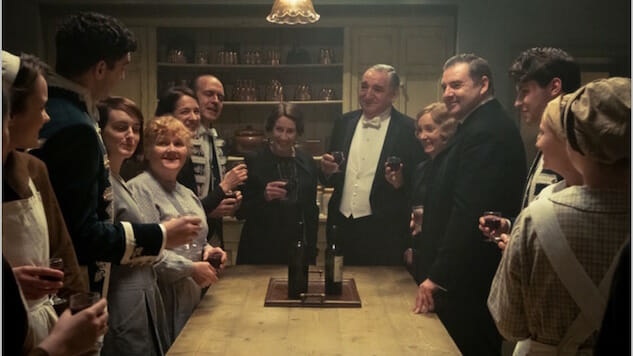The Downton Abbey Movie Is a Joyous, Satisfying Reunion
Photo Courtesy of Focus Features
“A royal visit is like a swan on a lake,” a footman opines. “Beauty and grace above, demented kicking below.” And this, more or less, is what we are treated to for two hours by Julian Fellowes and his film revival of Downton Abbey, which has returned four years after its series finale. The PBS (in the U.S.) juggernaut is now an Avengers-level film event for Anglophiles, as the entire original cast (or at least, those who were still part of the show in the final season) have returned to tell one more tale from the stately Yorkshire manor. This time, the King and Queen are coming for a visit, which is a perfect capsule tale that allows fan-favorites upstairs and down to put on a show.
The Downton Abbey movie saves time by not having to introduce its myriad characters, but even for those who can’t remember exactly how things ended (or may not remember much about it at all), there is a Merchant Ivory familiarity to the setting and the players that puts one at ease immediately. The series’ soapiness was always masked, in part, by outstanding costuming, sharp acting and a sweeping score, and these same elements come into play once more to save the movie’s script from being too familiar. There’s an early scene, in fact, where Isobel (Penelope Wilton) and the Dowager Countess (Maggie Smith) trade bon mots that end with small barbs about the other being a bastion of clichés. But the joke, to some degree, is that it doesn’t matter—we are endlessly entertained by them, regardless.
The same can be said of the film, which is never surprising and yet immensely satisfying. We’re introduced to several new characters whose arcs throughout the movie can be guessed during their first appearance onscreen. And yet because of the production’s light, witty and fully immersive aesthetic, all of it remains a delight (even one very silly attempt at an action sequence).
The film picks up in 1927, and finds the exceedingly charming cast almost exactly as we left them. Lady Mary (Michelle Dockery) is running the show, Tom Branson (Allen Leech) is still (quietly) an Irish republican, Lady Edith (Laura Carmichael) is very much Edith, Mrs. Hughes (Phyllis Logan) is handling everything, Anna (Joanne Froggatt) is the perfect mix of cleverness and compassionate, Daisy (Sophie McShera) and Mrs. Patmore (Lesley Nicol) never miss a beat with their patter, and Mr. Molesley (Kevin Doyle) is exceptional comic relief. But there is a whiff of revolution in the air, as the royal visit stirs up some budding anti-monarchist feelings among the staff, and even those upstairs are straining against the societal restraints placed upon them.